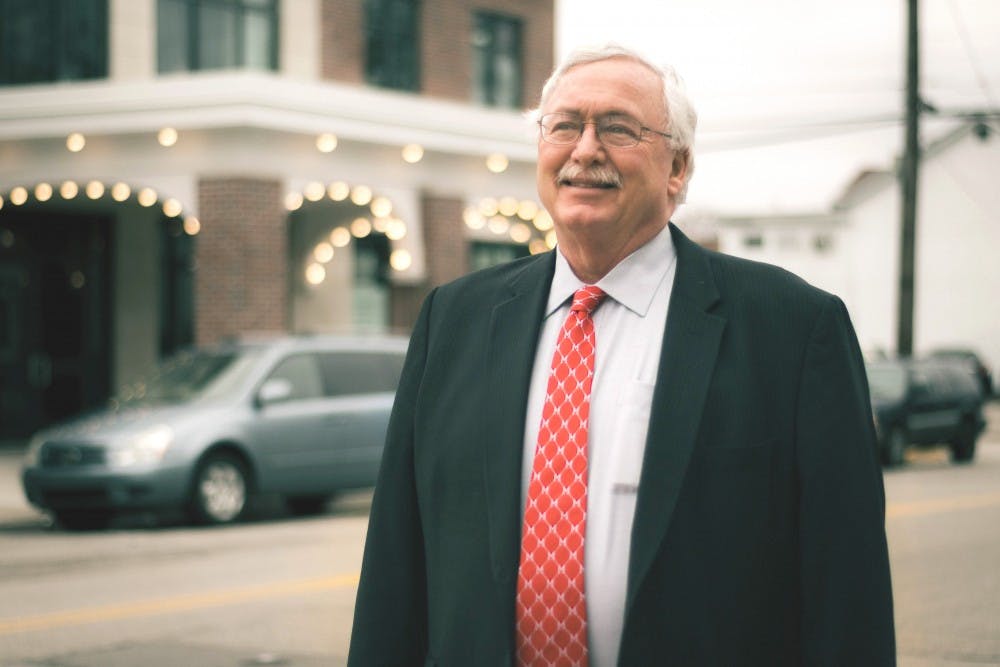In August 1962, 10-year-old Dennis Lieberman walked into the bathroom of an Alabama rest stop.

His family was making the trip in their station wagon from Indiana all the way down to Pensacola. The
y were not wealthy, but his parents always believed in taking a vacation every summer. They wanted to see the porpoises, and Dennis was excited to see the Florida tree moths, which fascinated him.
The bathroom he walked into had a sign on the door: "Colored Only."
When Dennis entered, the young man inside looked at him in horror and shock. What was a white boy doing in a segregated restroom?
When the proprietor of the rest stop realized what had happened, he started yelling at Dennis' parents.
"That left a real indelible vision in my mind as to how we treated people who didn't look like us," Lieberman said, "and how wrong I thought that was."
A few years later, in the process of filling out his family tree, he discovered that family on his dad's side had been killed in Auschwitz during the Holocaust.
These two incidents hardwired Dennis's dedication to promoting diversity and acceptance, a dedication that would be reinforced many times throughout his life and one that he would bring to Miami to make it a more diverse place.
Lieberman graduated from Miami in 1975 with degrees in political science and sociology. As a student here, he played football, joined the speech team and was a member of Alpha Delta Phi and Hillel. He took on leadership roles as the chair of the Interfraternity Council, Hall Council President and a member of the Miami University Student Foundation.
Lieberman was appointed to the Miami University Board of Trustees (BoT) by Governor Ted Strickland in 2009. He served on the board for nine years, the maximum tenure. He retired this month on Friday, Feb. 16.
Enjoy what you're reading?
Signup for our newsletter
In the decades in between, Lieberman accomplished much.
He studied law at the University of Dayton. At age 28, he started his own law firm with a few of his friends, a firm that would later merge with another to become what it is today: Flanagan, Lieberman, Hoffman & Swaim.
During his long and still ongoing law career, Leiberman specialized in criminal defense, especially in cases involving the death penalty. He has worked on nearly 30 death penalty cases, but he tends to remember the people more than the cases themselves.
The "$60,000 question" everyone asks him is whether he has ever defended someone he thought was guilty.
"Our society has a way of making people into monsters if they're accused of doing something," Lieberman said. "I see them as individuals...I really don't judge...it's more complex than what most people think."
Outside the courtroom, he served on the boards of several non-profit organizations including the Suicide Prevention Center in Dayton, the Dayton Food Bank and Legal Assistance to the Elderly, which he founded.
He also served as Chair of the Montgomery County Democratic Party.
In 2012, he was fired from that position when he defied a statewide directive that would eliminate early voting hours the weekend before the election that won President Obama his second term.
This method of voting was primarily used by African-American members of the community, Lieberman said. He sued over the issue, and the Supreme Court eventually ruled in his favor.
For this and many other actions taken during his career, including his appointment of the first African-American female to the Board of Elections, Lieberman has been given many accolades, such as the M.L.K. Humanitarian Award, the Access to Justice Advocacy Award, the Black Elected Office Holder's Presidential Award and the 2015 Humanitarian Award.
During eight of his nine years on the Board of Trustees, Lieberman served as the Secretary of the Board. He was most vocal about increasing diversity and inclusion at Miami, not just racially, but also economically. He worked to bring in first generation college students alongside people of many different religions, national origins and ethnicities.
"You have to entice people to come, then once they're here you have to make it a very open, embracing and comfortable experience," Lieberman said. "And the second part is sometimes more difficult than the first. I've heard it explained as getting an invitation to the party, but nobody asks you to dance."
In his time on the board, he advocated for making efforts to improve the comfort of minorities on campus, a decision rooted not only in moral sense but in business sense as well.
The United States in 2050 will look even more diverse than it does today, and Lieberman believes that Miami should reflect that. These efforts will continue into the future even now that Lieberman has retired from the board.
"Dennis has tirelessly endeavored to advance the public good and to assist others...he has ever striven to ensure that all may have a voice," the BoT stated in a Resolution of Appreciation for Lieberman's retirement.
"The Miami University Trustees, faculty, staff and students will miss Dennis' strong commitment to service, wisdom, experience and extraordinary insight," the statement read.
In the more than 40 years since Lieberman has attended Miami, much has changed, but, in his eyes, much has also stayed the same.
"When I was a student, there were things happening in the world that are much different from how they are today: Vietnam, civil rights, the assassination of Martin Luther King, Nixon being impeached and resigning," Lieberman said. "We as students were taught not to take things at face value but to be a critical thinker, and when I look around at students at Miami today, I think they do the same."
The concept of Love and Honor, he says, has also never changed. Lieberman fell in love with Miami from his first visit and loves it still, for the things it taught him and the friends it gave him.
"You can leave Miami, but Miami never leaves you," he said.




